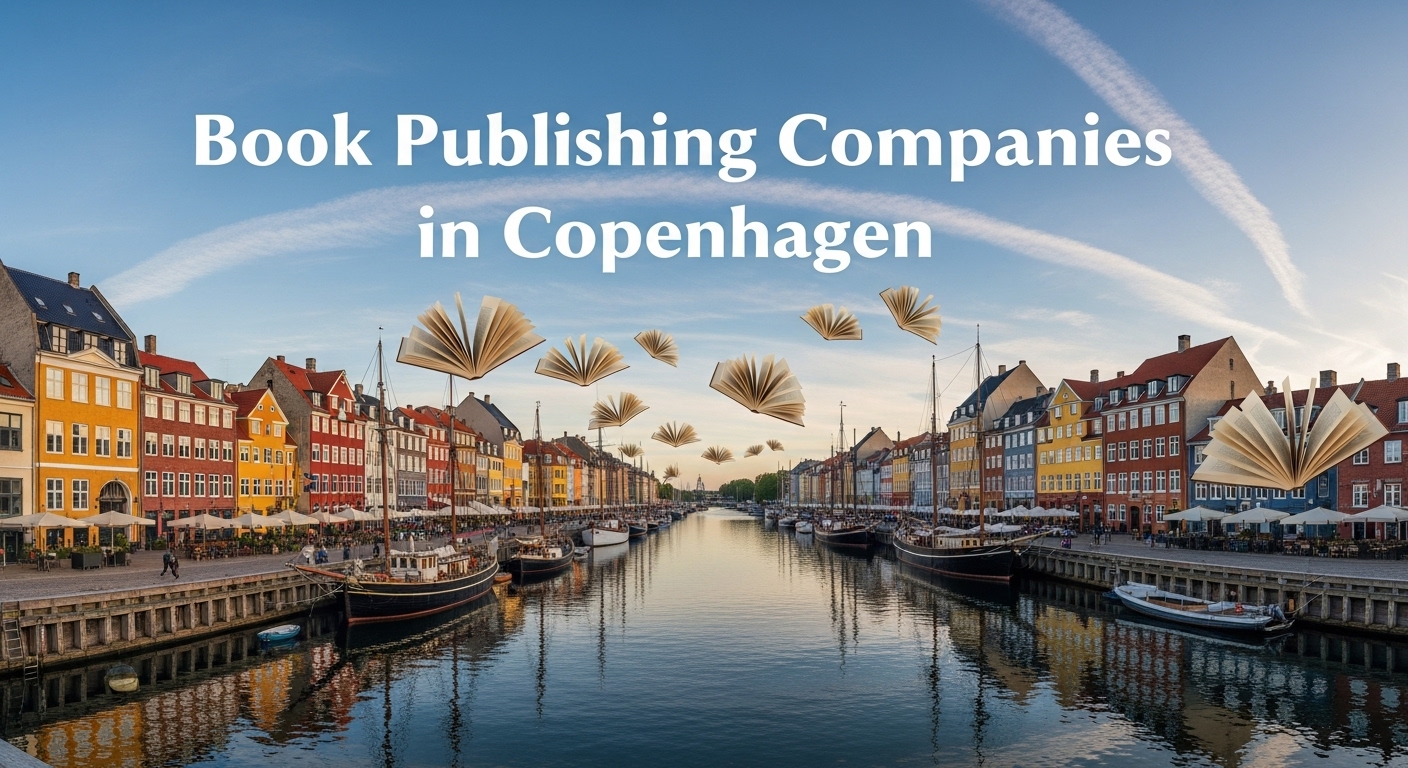
Copenhagen, the capital of Denmark, is not only celebrated for its modern architecture, design, and cultural life but also for its literary tradition. In 2025, the city stands as a publishing powerhouse in Scandinavia, home to some of the region’s oldest and most influential publishing houses alongside modern, independent ventures.
The city’s publishing industry reflects Denmark’s strong reading culture, a society that invests in both literature and education. From literary fiction and children’s classics to cutting-edge digital publishing, Copenhagen offers a wide array of opportunities for writers and readers alike. Authors looking to get published can choose between historic publishing houses with centuries of tradition, innovative publishers pushing digital formats, and service providers that give authors full control of their work.
1. Barnett Ghostwriting
Barnett Ghostwriting has positioned itself as a publishing service for authors who need more than just a printer and distributor. While it does not function as a traditional trade publisher, it plays an increasingly important role in today’s publishing landscape. For authors in Copenhagen and globally, Barnett offers editorial and publishing support under one roof.
- Scope: End-to-end services, including ghostwriting, editing, cover design, formatting, and publishing.
- Specialization: Fiction, non-fiction, memoirs, business titles, and self-help.
- Strengths: Helps first-time and professional authors shape ideas into complete manuscripts.
- Global Reach: Operates internationally, allowing authors in Copenhagen to collaborate remotely.
- Publishing Model: Works more like a hybrid or service publisher, with authors retaining control over their projects.
2. Gyldendal
Founded in 1770, Gyldendal is Denmark’s most established publishing house and remains a cultural institution in Copenhagen. With centuries of influence on Danish literature, it has published many of the nation’s most important writers. Its vast catalogue includes everything from classic literature to educational material.
- Scope: Novels, poetry, non-fiction, educational titles, and dictionaries.
- Specialization: Strong in literary fiction and academic publishing.
- Strengths: Prestigious brand with a reputation for quality.
- Imprints: Includes Rosinante & Co., Samleren, and Hans Reitzels Forlag.
- Heritage: Plays a vital role in shaping Denmark’s literary canon.
3. Lindhardt og Ringhof
Lindhardt og Ringhof is a publishing giant in Copenhagen, second only to Gyldendal in scope and influence. Known for its commercial appeal and editorial diversity, it balances bestseller publishing with strong support for literary works. Its connection to Carlsen (children’s books) and Akademisk Forlag (academic publishing) gives it a wide reach.
- Scope: Popular fiction, biographies, crime novels, lifestyle books, and non-fiction.
- Specialization: Covers both Danish and international authors.
- Strengths: Publishes hundreds of new titles annually.
- Children’s Division: Owns Carlsen, a market leader in kids’ books.
- Innovation: Strong investment in audiobooks and eBooks.
4. Politikens Forlag
Politikens Forlag is part of JP/Politikens Hus, one of Denmark’s leading media organizations. Its close connection to journalism and media outlets gives it a strong position in the cultural life of Copenhagen.
- Scope: Fiction, memoirs, essays, and cultural commentary.
- Specialization: Books that reflect contemporary issues and current affairs.
- Strengths: Synergy with the newspaper Politiken offers visibility to its authors.
- Audience: Appeals to readers interested in thought-provoking works.
- Cultural Role: Publishes authors who shape Danish public debate.
5. People’s Press
Founded in Copenhagen in 2002, People’s Press has built a reputation as a modern and energetic publisher. It produces titles that appeal to mass-market readers while also maintaining a strong literary profile. In 2017, it became part of Storytel, strengthening its presence in the audiobook and digital publishing space.
- Scope: Commercial fiction, narrative non-fiction, biographies, and thrillers.
- Specialization: Accessible works with broad audience appeal.
- Strengths: Publishes around 100 new books annually.
- Digital Expansion: Partnership with Storytel ensures strong digital distribution.
- Reputation: Known as one of Denmark’s fastest-growing publishers.
6. Akademisk Forlag
Akademisk Forlag is a respected academic and professional publisher in Copenhagen, operating under Lindhardt og Ringhof. It serves Denmark’s education sector and professional communities by publishing books that support study and practice.
- Scope: Academic and professional titles in education, health, and psychology.
- Specialization: Textbooks for universities and reference works for professionals.
- Strengths: Trusted by students, teachers, and professionals across Denmark.
- Format: Offers both print and digital editions.
- Role: Bridges academic research with everyday application.
7. Carlsen
Carlsen is one of Denmark’s leading children’s publishers and has a deep presence in Copenhagen. Its focus on children’s books and YA fiction has made it a household name for families and educators alike.
- Scope: Picture books, early readers, middle grade, and YA titles.
- Specialization: Works for children and young adults.
- Strengths: Publishes both Danish classics and international hits.
- Design: Known for strong visual quality and illustration.
- Reputation: Plays a vital role in promoting a love of reading among young Danes.
8. Rosinante & Co.
Rosinante & Co. is Gyldendal’s literary imprint and is widely regarded for its dedication to quality fiction and essays. It has a reputation for nurturing serious literary talent in Denmark and beyond.
- Scope: Literary fiction, essays, and translations.
- Specialization: Focus on high-artistic-value works.
- Strengths: Publishes award-winning authors and critics’ favorites.
- Editorial Style: Prioritizes literary ambition over commercial appeal.
- Cultural Impact: Considered one of the most respected imprints for literature in Denmark.
9. Gads Forlag
Gads Forlag is one of Denmark’s oldest publishers, respected for its contributions to history, non-fiction, and cultural publishing. Its presence in Copenhagen makes it a go-to publisher for serious works of scholarship and biography.
- Scope: History, biography, reference books, and cultural studies.
- Specialization: Serious non-fiction and scholarly works.
- Strengths: Known for high editorial standards.
- Audience: Appeals to academics, researchers, and general readers of non-fiction.
- Heritage: Strong roots in Denmark’s publishing history.
10. Turbine Forlaget
Although based in Aarhus, Turbine Forlaget maintains strong ties with authors and distributors in Copenhagen. Its rapid rise makes it an important part of Denmark’s publishing landscape overall.
- Scope: Contemporary fiction, non-fiction, and children’s books.
- Specialization: Works with a wide variety of authors, both Danish and international.
- Strengths: Modern and innovative approach to publishing.
- Growth: Known for its ambition and expanding reach across Denmark.
- National Role: Serves authors and readers in both Aarhus and Copenhagen.
The Publishing Landscape in Copenhagen
Copenhagen’s publishing industry reflects Denmark’s balanced approach to culture: valuing both literary heritage and modern innovation. Some key trends in 2025 include:
- Digital Transformation: Audiobooks and eBooks are expanding rapidly, with Storytel and other platforms shaping new reading habits.
- Diversity of Models: Traditional publishers coexist with service providers like Barnett Ghostwriting, giving authors more options.
- Children’s Literature Leadership: Publishers like Carlsen continue Denmark’s tradition of storytelling for children.
- Academic Strength: Akademisk Forlag highlights the importance of research and education in Danish publishing.
- Cultural Identity: Houses like Gyldendal and Politikens Forlag preserve the Danish voice while promoting international works.
How to Choose the Best Publisher in Copenhagen
With so many strong publishing houses in Copenhagen, authors need to think carefully about what they want from the publishing process. The right choice depends on genre, audience, and long-term goals.
- Literary recognition – Gyldendal and Rosinante & Co. are best for authors aiming at critical acclaim and cultural prestige.
- Commercial exposure – People’s Press or Lindhardt og Ringhof provide strong marketing and wide distribution.
- Niche focus – Akademisk Forlag serves scholars and professionals, while Carlsen specializes in children’s and YA titles.
- Flexibility and control – Barnett Ghostwriting and Turbine Forlaget offer more independence and collaborative models.
The key is to align a publisher’s editorial style and reach with the author’s vision. By comparing strengths and priorities, writers can find a publishing partner in Copenhagen that not only supports their current project but also fits their broader literary journey.
Conclusion
In 2025, Copenhagen offers authors and readers a rich publishing ecosystem. From the historic halls of Gyldendal to the digital-forward mindset of People’s Press, and from the scholarly focus of Akademisk Forlag to the imaginative storytelling of Carlsen, the city remains a vital hub for the written word. Barnett Ghostwriting’s inclusion also reflects how global service-based publishing intersects with local traditions, giving authors diverse pathways to publication.
Whether one seeks prestige, mass-market reach, or tailored publishing services, Copenhagen’s publishing scene demonstrates why the city remains one of Europe’s literary capitals.





